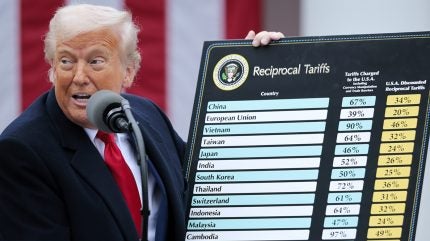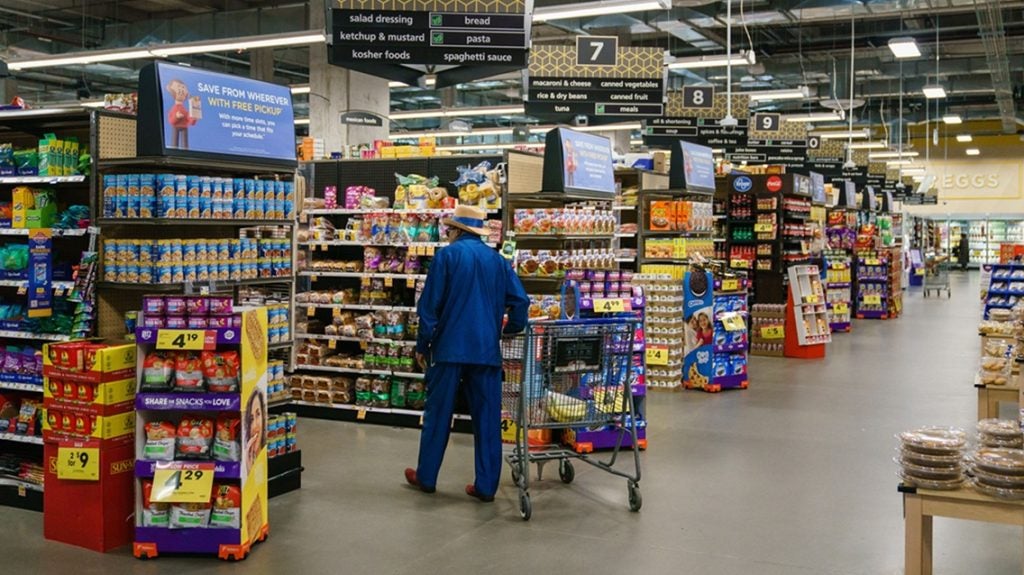
President Trump has set out a range of new tariffs on imports into the US, arguing the moves will strengthen the country’s economy.
“My fellow Americans, this is Liberation Day,” Trump said in the Rose Garden of the White House yesterday (2 April) as he unveiled a universal “baseline” tariff of 10% on all imports into the US. The levy will come into effect on Saturday.

Discover B2B Marketing That Performs
Combine business intelligence and editorial excellence to reach engaged professionals across 36 leading media platforms.
Some nations and trading blocs face higher rates; EU imports are to be hit with a 20% tariff, products from Japan have been lined up with a tariff of 24% and shipments from China are to be slapped with a levy of 54% (though that includes earlier tariffs). These are set to go live on Wednesday.
The 10% baseline tariff does not apply to imports from Canada and Mexico but the countries have already been targeted with separate measures.
As business leaders digest the announcement, here is a snapshot of the breaking reaction from within the food industry.
“It is essential that both sides prioritise constructive dialogue” – FoodDrinkEurope
Industry body FoodDrinkEurope stressed in a statement that two-way trade between the EU bloc and the US in agri-food raw materials, ingredients, and finished products amounts to €40bn ($44.2bn).

US Tariffs are shifting - will you react or anticipate?
Don’t let policy changes catch you off guard. Stay proactive with real-time data and expert analysis.
By GlobalData“The EU food and drink industry is a major driver of growth, employment, and innovation, with significant investments from EU and US companies in both regions,” the trade association said.
“We reiterate our call for the de-escalation of trade tensions and welcome the EU’s desire to reach a negotiated outcome. It is essential that both sides prioritise constructive dialogue to find solutions that safeguard the integrity of our long-standing and mutually beneficial transatlantic trade relationship.”
US trade group Consumer Brands Association raises issue of ingredients
Across the Atlantic, Consumer Brands Association, the US trade body that counts some of the country’s major food manufacturers as members, highlighted the prospect of higher ingredient costs.
“As the largest domestic manufacturing sector by employment, supporting more than 22 million American jobs and contributing $2.5trn to the US GDP, the consumer packaged goods industry already manufactures the majority of its products here in the United States. However, there are critical ingredients and inputs that need to be imported due to scarce availability domestically. No amount of tariffs will bring these inputs back to the US,” Tom Madrecki, vice president of supply chain resiliency at Consumer Brands Association (CBA, said.
Madrecki said CBA wants the Trump administration to “fine-tune” its approach and exempt “key ingredients and inputs” from the levies. Doing so, he added, would “protect manufacturing jobs and prevent unnecessary inflation at the grocery store”.
“However well intended, the success of the President’s America First Trade Policy, must recognise the US companies that are already doing it the right way but depend on imports for specific ingredients and inputs that cannot be sourced domestically. Reciprocal tariffs that do not reflect ingredient and input availability concerns will inevitably raise costs, limit consumer access to affordable products and unintentionally harm iconic American manufacturers.”

“Our customers are apprehensive” – US food retail and wholesale association FMI
In a statement issued within 90 minutes of Trump’s announcement, FMI president and CEO Leslie Sarasin said the association “appreciates and supports the Trump administration’s desire to protect American jobs, boost our manufacturing sector and lower grocery prices – goals we are committed to working with President Trump to achieve”.
However, Sarasin expressed concerns the tariffs could push up prices and weigh on consumer confidence.
“While we have witnessed several positive steps that have reduced unnecessary regulatory burdens on our industry, we are concerned that today’s tariff announcement could bring rising prices, a squeeze on household budgets and reduced competitiveness for American companies relative to international competitors,” Sarasin said. “The uncertainty and inflationary pressures created by reciprocal tariffs are a major worry for American consumers and our food industry member companies that operate on slim 1.6% retail and 7.5% food manufacturing net margins. Our customers are apprehensive.
““Our food system is intricately linked with global markets − including products not grown in the United States like bananas or seasonal items − which helps keep prices down while providing American shoppers year-round access to safe, nutritious food.”
“For too long, America’s family farmers and ranchers have been mistreated” – National Cattlemen’s Beef Association
On the White House website, the administration ran a press release entitled: President Trump’s Bold Trade Action Draws Praise. The statement carried a list of positive responses to the US president’s announcement, including from Ethan Lane, the SVP of government affairs at the National Cattlemen’s Beef Association.
“For too long, America’s family farmers and ranchers have been mistreated by certain trading partners around the world. President Trump is taking action to address numerous trade barriers that prevent consumers overseas from enjoying high-quality, wholesome American beef,” Lane said.
“NCBA will continue engaging with the White House to ensure fair treatment for America’s cattle producers around the world and optimise opportunities for exports abroad.”
Negotiation and comprise was the key message coming out of Europe in the wake of the tariff announcement.
The 10% tariff “remains a challenge for the UK and for agriculture” – The National Farmers’ Union
UK farm group The National Farmers’ Union pointed out the US was the country’s largest market for agri-food products outside the EU.
The NFU also underlined how products that would’ve been shipped to the US could be “redirected to the UK, negatively impacting our market”.
Tom Bradshaw, the NFU president, said: “While the UK has been hit by a lower baseline tariff compared to the EU, this remains a challenge for the UK and for agriculture, with the US being our second largest export market beyond the EU.
“While this is a developing and concerning situation, we are working in genuine partnership with the government and sharing our expertise on this to ensure, if there is any market disruption in response to a change in the movement of goods and products between affected countries, we can respond swiftly.”

“Retaliatory trade measures will not benefit farmers in either the EU or the US” – EU farm lobby body Copa Cogeca
Diplomatic efforts to resolve the tariff spat between the EU and the US rather than react with reciprocal taxes and potentially kick-off a trade war was the solution put forward by both Copa and Cogeca, the umbrella agriculture organisations representing farmers and cooperatives in the bloc’s member states.
Cogeca president Lennart Nilsson said in a joint statement. “Retaliatory trade measures will not benefit farmers in either the EU or the US. Instead, they will limit our opportunities, raise prices, and weaken the resilience of agricultural businesses.
“We call on both administrations to prioritise negotiations and explore all diplomatic avenues before resorting to measures that could have long-lasting consequences.”
Copa president Massimiliano Giansanti said European farmers “are already facing mounting challenges, from rising production costs to climate-related pressures”.
He added: “These new tariffs will add to further uncertainty and financial strain on our sector, affecting both producers and consumers. Ensuring our food security must be Europe’s compass in these difficult times, as our common national security starts there. We urge policymakers on both sides to seek dialogue and avoid a full-scale trade conflict.”
EU preparing counter-measures, von der Leyen says
The European Commission president, Ursula von der Leyen, issued a strongly worded statement, saying she was “ready to support any efforts to make the global trading system fit for the realities of the global economy, but, at the same time said: “I also want to be clear: reaching for tariffs as your first and last tool will not fix it.”
She added in a statement rolling off specific concerns: “The global economy will massively suffer; uncertainty will spiral and trigger the rise of further protectionism; the consequences will be dire for millions of people around the globe.”
And the EU president suggested reactionary measures are in the pipeline.
“We are already finalising a first package of countermeasures in response to tariffs on steel. And we are now preparing for further countermeasures, to protect our interests and our businesses if negotiations fail,” von der Leyen said.
“We will also be watching closely what indirect effects these tariffs could have, because we cannot absorb global overcapacity nor will we accept dumping on our market.”





